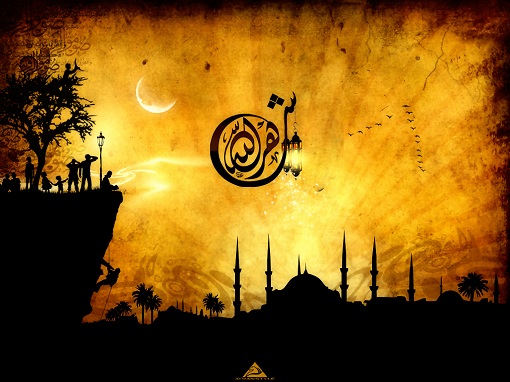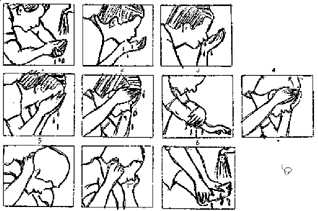
In Islam there are five Islamic prayers each day that must be done
(obligatory), and there are non-obligatory prayers.
Preparing to do Islamic prayer (in Arabic, called salat):
- You must wear clean clothes.
- You must choose a clean place to do prayer (salat).
- Before prayer you must do ablution if needed to clean your body parts which were exposed to dirt.
- You can do prayer in any clean place – in your home, in your workplace, even at your garden – but you must ensure that place is clean.
- There are five Islamic prayers
that are obligatory.
- The first is in the morning time which is called salat el Fajr, and it is two rakats.
- The second is in the noon time and is called salat el zuhr. It is four rakats.
- The third is in the afternoon time, called salat el asr – also four rakats.
- The fourth is in the evening time. It is called salat el maghrib and is three rakats.
- The fifth is in the nighttime, called salat el eshaa, and it is four rakats.
- You must face the kiblah (the direction that Muslims face during the prayer), which is the kaaba in Mecca, Saudi Arabia.
- The prayer must be done in Arabic. We will provide the words that you will say as spoken in Arabic, as well as the meaning in English.
- The Islamic prayer is so easy and simple and can be easily done each day with ease and a calm soul.
Preparation for the Contact Prayer (The Ablution)
The Partial Ablution (wudu)
Before offering the prayer one must be in good shape and pure condition. It is necessary to wash the parts of the body which are generally exposed to dirt or dust or smog. This performance is called ABLUTION (Wudu') and is preferably carried out as follows:

1. Declare the intention that the act is for the purpose of worship and purity, start by saying Bismillah.
2. Wash the hands up to the wrists, three times.
3. Rinse out the mouth with water, three times, preferably with a brush whenever it is possible.
4. Cleanse the nostrils of the nose by sniffing water into them, three times.
5. Wash the whole face three times with both hands, if possible, from the top of the forehead to the bottom of the chin and from ear to ear.
6. Wash the right arm three times up to the far end of the elbow, and then do the same with the left arm.
7. Wipe the whole head or any part of it with a wet hand, once.
8. Wipe the inner sides of the ears with the forefingers and their outer sides with the thumbs. This should be done with wet fingers.
9. Wash the two feet up to the ankles, three times, beginning with the right foot.
At this stage the ablution is completed, and the person who has performed it is ready to start to start his prayer.When the ablution is valid a person may keep it as long as he can, and may use it for as many prayers as he wishes. But it is preferable to renew it as often as possible. It is also preferable to do it in the said order, although it will be accepted from those who fail to keep this order. Ablution in the said way is sufficient for prayer unless it is nullified.by any reason.
A Demonstration of Wudu' { Ablution } Video
Nullification of the Ablution
The ablution becomes nullified by any of the following
1. Natural discharges, i.e., urine, stools, gas, etc...
2. The flow of blood or pus and the like from any part of the body;
3. Vomiting;
4. Falling asleep;
5. Losing one's reason by taking drugs or any intoxicating stuff.
After the occurrence of any of these things the ablution must be renewed for prayer. Also, after natural discharges, water should be applied because the use of toilet tissues may not be sufficient for the purpose of purity and worship.
The Complete Ablution (Ghusl/Bath)
The whole body with the nostrils, mouth and head must be washed by a complete bath before commencing prayer in any of the following cases:
1. After intimate intercourse;
2. After wet dreams; or night discharge;
3. Upon expiration of the menstruation period of women;
4. At the end of the confinement period of nursing women, which, is
estimated at a maximum of forty days. If it ends before, complete ablution
should be done.
It should be pointed out that at the start of the bath or ablution the
intention must be clear that it is for the purpose of purity and worship.
Also, a person who is performing an ablution, partial or complete, should
combine his performance with some utterances glorifying God and asking Him
for true guidance. The forms of such utterances are described in detail in
the elaborate sources of the religion. One, however, can say one's own best
utterances if one does not know the exact wording. That is sufficient as
long as it is in the praise of God and is said with sincerity.
HOW TO PERFORM THE CONTACT PRAYERS
|
Takbir |
|
|
| Qiyaam Muslims place their right hand over their left on their chest or navel while in the standing position (this may vary according to the subdivision followed). A short supplication glorifying God and seeking His protection is read. This is then followed by Surah Al Fatiha, which is the first chapter in the Qur'an. Verses from any another chapter are then recited. |
 |
| Ruku Ruku means bowing. During ruku, Muslims says 'glory be to God, the Most Great', three times. During prayer, it is forbidden to fidget or look around. Muslims must pray as though they are in the presence of God, and therefore must be in a state of concentration. |
 |
| Brief qiyaam While moving into the upright position, Muslims recite 'God listens to the one who praises Him' and while in the standing position, 'To God belongs all praise' then is recited. 'God is Great' is recited again. Hands are loosely at the sides this time. Each movement is always preceded by the phrase 'God is Great'. This indicates to followers of the prayer that the leader is about to make the next movement. |
 |
| Sujud Sujud means to prostrate. While in the prostration position 'Glory be to God, the Most High' is repeated three times. Palms, knees, toes, forehead and nose must be the only body parts touching the ground. The Prophet said, "The worst thief is he who steals from his prayer." His companions asked, "O Messenger of Allah, how does he steal from his prayer?" He said, "He does not perfect its ruku and sujud". |
 |
| Brief sitting 'God is Great' is recited while moving to the sitting position. Muslims pause here for a few seconds, either staying silent, or reciting a shorter prayer. 'God is Great' is recited once more as the sujud position is taken again. The Prophet recommended that each movement must last at least the time that it takes for the bones to settle. He compared some people's ruku' and sujud to the way that a crow pecks on the ground, because of the speed at which they perform it. (Ibn Khuzaymah) |
 |
| Sujud This sujud is the same as the first one. After reciting 'Glory be to God, the Most High', one 'raka'ah', or unit is complete. Each salah has its own number of units though. The shortest prayer, Fajr, has two. To continue the prayer from the sujud position, Muslims say 'God is Great' and stand up to repeat everything from Surah Al Fatiha, until they reach this sujud again. |
 |
| Tashahhud After saying God is Great, Muslims return to the sitting position. They recite a set number of short prayers in Arabic, praising God, and sending peace on the Prophet. They repeat the declaration of faith, raising the forefinger of their right hand, in order to act as a witness. They then ask God to bestow blessings and peace upon Prophet Abraham and his family, and ask for the same for Prophet Muhammad. Finally, Muslims ask for forgiveness and mercy, and ask God to bless them and their children until the Day of Judgement. |
 |
| Peace to the right To end the prayer, Muslims first turn their face to the right saying 'Peace be upon you, and the mercy and blessings of Allah.' This is said to the Angels which Muslims believe accompany each human being to record their actions. |
 |
| Peace to the left 'Peace be upon you, and the mercy and blessings of Allah' is repeated turning to the left side now. Muslims believe the Angel on the right side records all good actions and thoughts, while the one on the left records all bad actions. |
 How to Pray in Islam - How to Make Salaat (VIDEO) |
______________________________________________________________________________________________________
The Group Prayer
Two or more people may observe the Contact prayers together. One person leads the group prayer, uttering "The Key" in a loud enough voice to be heard by everyone in the group. Other utterances must be silent. Anyone may join the group late, in the middle of the prayer. He or she must make the same moves as the group. Then, at the end of the prayer, he or she must stand up and make up whatever portion was missed.
The Friday Prayer
The Friday Congregational Prayer (Salat Al_Jum`ah) is so important, a whole sura is entitled "Friday" and a commandment is decreed in Verse 62:9 to observe this prayer. Every Submitter - man, woman, and child - is commanded by God to observe the Friday Congregational Prayer.
The Friday Prayer replaces the Noon Prayer every Friday. Instead of 4 units, the Friday Prayer consists of listening to two sermons delivered by the Imam, and two units of prayer.
Each sermon must begin with "Al-Hamdu Lillah" (Praise be to God), "Laa elaaha Ellaa Allah" (No other god besides God). Each sermon should last 10-15 minutes and must be delivered in the language of the congregation. At the end of the first sermon, the congregation is asked to repent, "Tooboo Ela Allah." The Imam then sits down for about a minute and makes his repentance together with the congregation, then stands up for the second sermon. The second sermon ends by asking one of the people to say Azaan. The Imam leads the 2-unit prayer.
At the End of Every Prayer
The worshippers may shake hands, hug each other, and /or exchange greetings after completing the prayer. The custom is to say to each other, "Congratulations." This is because the Contact Prayers are a gift from God, that helps us nourish and develop our souls. One should be congratulated upon completing such a blessed accomplishment.

